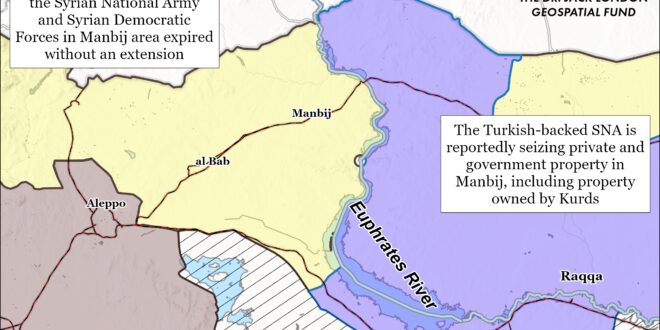The HTS-controlled interim government is continuing to reconcile with former members of the Syrian Arab Army (SAA). The Russian-backed SAA 5th Corps in Lattakia is reportedly negotiating with the interim government to “merge its forces” into the new Syrian army.[1] Integrating members of other armed groups, including the SAA, into the new army could reduce insecurity and instability during the transition period. Syrian media separately reported on December 16 that the interim government is negotiating with the Iraqi federal government to “recover” over 2,000 former SAA soldiers who fled to Iraq during the Syrian opposition offensive.[2] Around 2,150 SAA soldiers and high-ranking officers are currently staying at a camp in western Anbar Province near the Iraqi border with Syria.[3] The mayor of Rutba District, Anbar Province, told Iraqi media on December 16 that the majority of soldiers at the camp wish to return to Syria since HTS granted a general amnesty to SAA soldiers whom the Assad regime conscripted under compulsory service.[4] HTS leader Ahmed al Sharaa (aka Abu Mohammad al Jolani) stated on December 15 that he will end mandatory conscription in Syria.[5] It is unclear how the interim government will generate enough income to support a volunteer army.
The HTS-controlled interim government is also continuing to signal that it will reform the Syrian security establishment. The interim government Interior Minister, Mohammed Abdul Rahman, stated in an interview with al Araby on December 16 that the interim government has a “ready plan” to reform the security establishment.[6] Rahman stated that the security establishment needs “major reforms,” including in the fields of “procedures, internal work regulations, and laws.” Rahman added that the interim government will dissolve security institutions that were previously “a source of terror” for the Syrian people. The Interior Ministry has begun recruiting police officers in Damascus, Hama, and Homs in recent days as part of a “comprehensive plan to ensure access to a safe society.”[7] Syrian media previously reported that the interim government would “conduct an assessment” and reorganize the SAA.[8]
HTS leader Ahmed al Shara (aka Abu Mohammad al Jolani) met with UN Special Envoy to Syria Geir Pedersen in Damascus to discuss a Syrian political transition within the framework of UNSCR 2254.[9] Syrian caretaker Prime Minister Mohammed al Bashir also attended the meeting.[10] Pedersen stressed the need for a Syrian-led political transition based on the principles of UNSCR 2254.[11] The UN adopted UNSCR 2254 in 2015 to call for a full ceasefire in Syria and set guidance and benchmarks for Syria’s political transition, including establishing a constitution and holding free and fair elections within 18 months.[12]
HTS has not suggested it will implement key elements of UNSCR 2254 and is attempting to change the resolution’s guidance to account for Syria’s “new reality.”[13] The conditions in Syria in 2015 under which the UN adopted UNSCR 2254 were much different than those in Damascus today under Shara’s and HTS’ control. The caretaker government’s term will end in March 2025, but the government has not set up a timeline for holding elections.[14] Shara noted on December 16 that Syria is not ready for elections, and the interim government has so far failed to outline any process for generating a constitution.[15] HTS-selected officials within the transitional government would presumably be relied upon to establish a method to write a constitution, including the selection of various powerbrokers across the country and in different minority groups to attend negotiations. Shara and other HTS officials have alluded to a potential pursuit of a technocratic government that would place Syrian institutions under the ”supervision of specialized teams.”[16] A true technocratic government would appoint ministers to positions based on experience regardless of affiliation with HTS, however. It is unclear if Shara is willing to incorporate non-HTS members into the new Syrian government.
The international community has continued to engage HTS leader Ahmad al Shara and the HTS-controlled interim government in Damascus. HTS has conducted more diplomatic engagements in its first week than the Taliban did in the five weeks following the fall of Kabul.[17] Qatar and Lebanon announced the re-opening of their respective embassies in Damascus.[18] The French Foreign Ministry announced that it will send a delegation to Damascus on December 17.[19] EU High Representative for Foreign Affairs and Security Policy Kaja Kallas told reporters that she has sent a European diplomat to establish contact with the new Syrian government but will not lift sanctions until the HTS-led government demonstrates that it will protect minority rights, women’s rights, and disavow extremism.[20] The United States, European Union, and United Nations have designated HTS as a terrorist organization.[21] Shara called on governments such as the United States to remove their terrorist designations for HTS on December 16.[22] Shara claimed that lifting the designations is necessary for Syria to rebuild.[23]
A four-day ceasefire between the Syrian National Army (SNA) and Syrian Democratic Forces (SDF) in the Manbij area expired without an extension on December 16. The four-day ceasefire lasted from December 12 to 16 to allow humanitarian aid to enter and unspecified security agreements to be negotiated.[24] The SDF Media Center said on December 16 that US-backed efforts to declare a permanent ceasefire in Manbij and Kobani failed. The SDF blamed Turkey for its inflexibility.[25] The Turkish foreign minister said on December 13 that Turkey’s strategic objective in Syria is to “destroy” the SDF, meaning that any ceasefire between the SDF and Turkish-backed groups is presumably temporary.[26] An SNA capture of Kurdish areas like Kobani risks triggering ethnically motivated violence and upsetting Syria’s current relative stability. Initial social media reports indicate that Turkish-backed forces have begun an advance toward Kobani.[27] CTP-ISW will closely monitor this development and issue updates in the coming days.
The Turkish-backed SNA is reportedly seizing private and government property in Manbij. Local media reported that at least some of these seizures target Kurds, “under the pretext of [the Kurds] belonging to the SDF. Local sources reported on December 16 that the SNA is seizing cars and buildings from residents in Manbij.[28] The SNA also took control of parts of the local electricity grid.[29] The SNA-managed Civil Administration in Manbij issued three notices related to car theft, the circulation of the Syrian currency and the US dollar, and price controls on bread and other goods on December 16.[30] The SNA sent civil authorities and military police to Manbij to begin managing the city and the surrounding areas on December 9 after seizing the city from the Syrian Democratic Forces.[31]
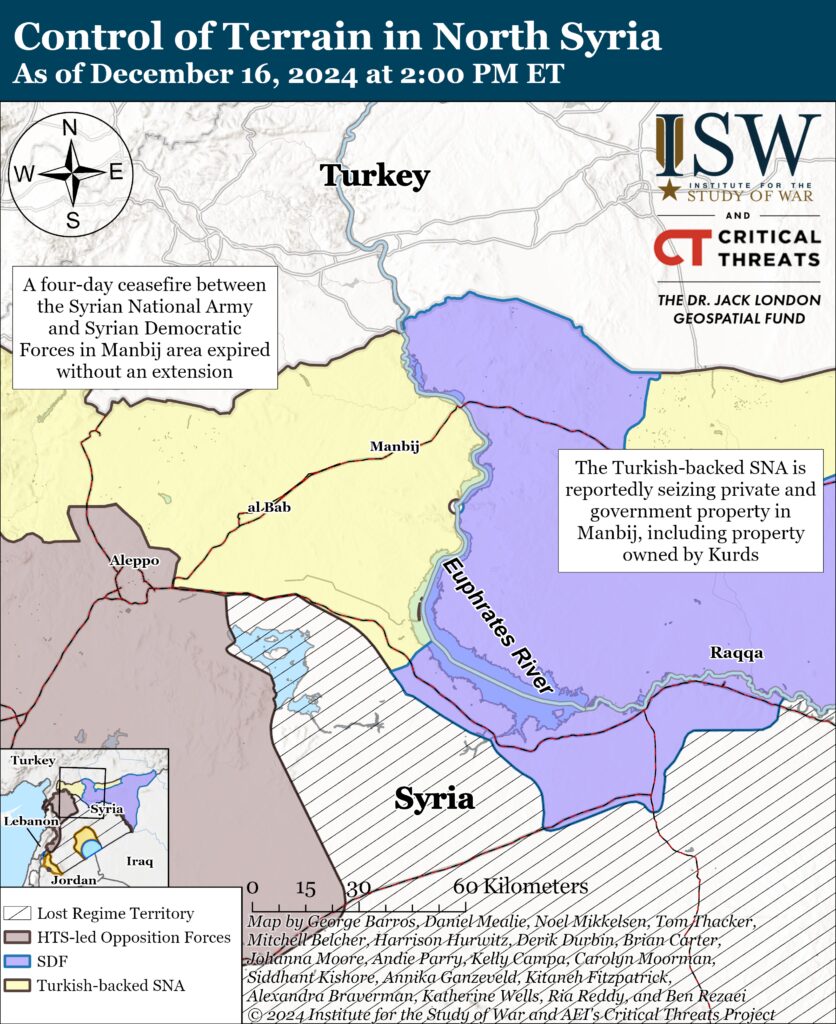
Arab elements continue to defect from the Syrian Democratic Forces. The head of internal security for the al Busayrah and Dhiban region in SDF-controlled Deir ez Zor Province announced he and “hundreds” of his fighters would join the HTS-led Military Operations Department.[32] This internal security officer is at least the fourth SDF-affiliated security leader in Deir ez Zor Province to defect since the fall of the Assad regime.[33] Local media similarly reported that over 150 Arab elements defected from the military academy affiliated with the SDF in al Shaddadi, Hasakah Province.[34] The US maintains a force presence near both al Shaddadi and Dhiban, and continued defections risk further drawing in US forces and compromising the ability of the international coalition to conduct counter-ISIS missions. There is also a significant ISIS presence near Dhiban.[35] Only the SDF is capable of conducting competent counter-ISIS operations in the areas it controls, given that HTS and other groups are currently preoccupied with securing newly controlled areas. CTP-ISW previously assessed on December 13 that Abdi intends to negotiate a role for the SDF in a future Syrian government, likely to prevent further unrest within Arab populations and militias living under its control.[36]
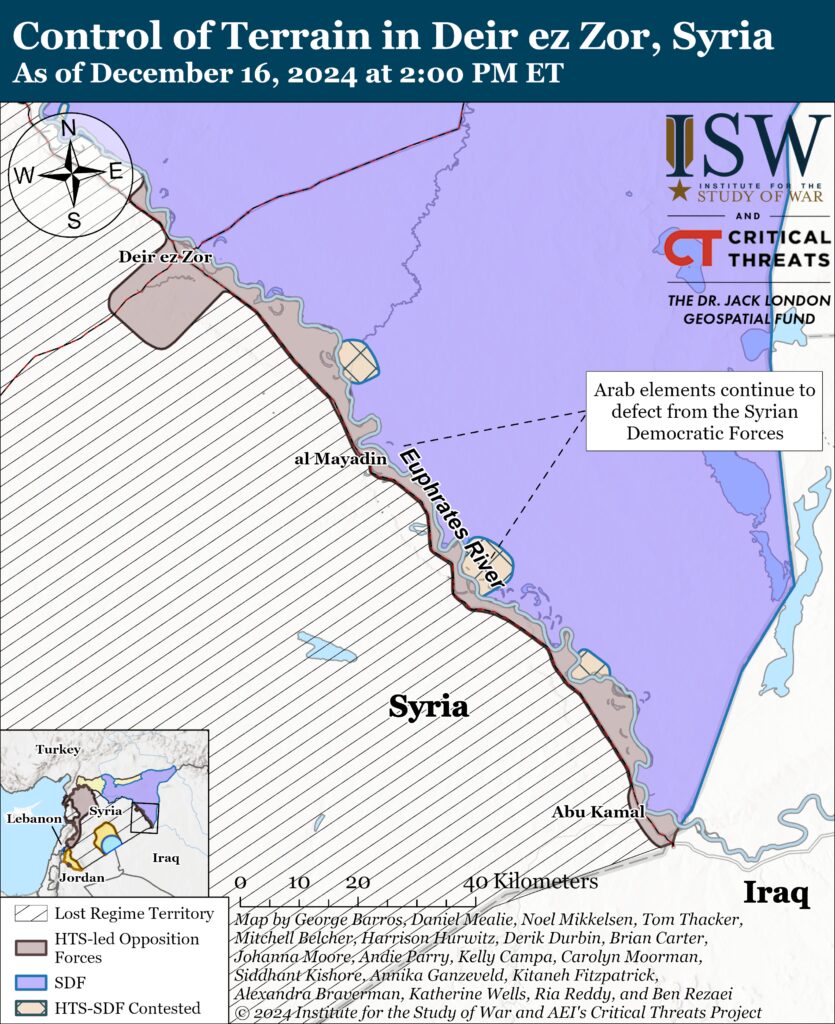
The Israel Defense Forces (IDF) continued to operate in southern Syrian towns near the Jordanian border on December 16. Geolocated footage shows Israeli forces operating in the villages of Abidin and Maariyah in the Yarmouk Basin. Both villages are just outside the 1974 disengagement line in Daraa Province.[37] Israeli forces operated in this general area on December 15 as well.[38] Israeli military officials have approved plans for operations further into Syria, but the Israeli presence in Abidin and Maariyah does not appear to be the start of a broader campaign.[39] The IDF’s operation along the Jordanian border comes after December 13 talks to discuss the situation in Syria and the threat of Iranian weapons smuggling to Palestinian militias in the West Bank.[40] ISIS also historically maintained a presence in the Yarmouk Basin.
The IDF continued to target former SAA positions across Syria after CTP-ISW’s last data cutoff on December 15. Geolocated imagery posted on December 15 shows a massive explosion at a weapons warehouse near Bamlaka village, Tartus Province.[41] Local sources reported that Israeli airstrikes also targeted former SAA sites in HTS-controlled territory in Deir ez Zor Province.[42]
The Israeli cabinet approved Prime Minister Benjamin Netanyahu’s plan to double the population in the Israeli-controlled Golan Heights on December 15.[43] Netanyahu’s plan proposed 40 million NIS (around USD 11 million) to increase education and renewable energy sources in Golan Heights settlements as well as establishing a student village and a plan for bringing in new residents. Israeli media reported that already 50,000 Israeli Jewish and Druze citizens live in these settlements.[44] Netanyahu stated that “strengthening the Golan Heights is strengthening the State of Israel.” Several governments, including Turkey, Saudi Arabia, Qatar, the United Arab Emirates, and Germany criticized Netanyahu’s plan, calling it a violation of the 1974 Disengagement Agreement between Israel and Syria.[45]
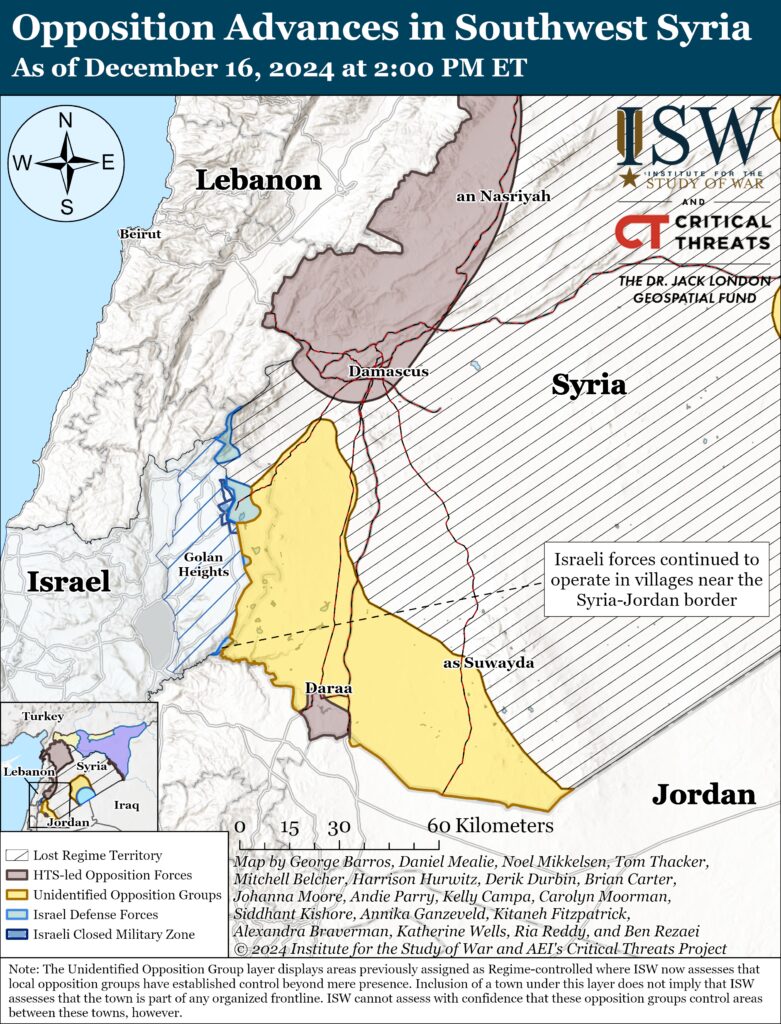
Israel’s large-scale aerial attack on Iranian missile production sites on October 25 significantly damaged Iran’s missile production capability, including its ability to export Iranian-made missiles to partners like Russia and the Houthis.[46] An unspecified Israeli military source told the Washington Post that Israel’s October 25 strike in Iran caused Iran’s solid-fuel ballistic missile production to drop from two ballistic missiles a day to one missile per week.[47] Iran’s capacity to produce new missiles is unlikely to increase, given that it would take at least a year for Iran to acquire new solid fuel mixers from China to replace the Iranian mixers that Israel destroyed on October 25.[48] The decrease in Iranian ballistic missile production will make it difficult for Iran to conduct another large-scale missile attack targeting Israel and would presumably prevent Iran from supplying the Houthis or Russians with solid-fuel ballistic missiles.[49] The Houthis continue to launch missile and drone attacks targeting sites in Israel, using Iranian-made missiles.[50]
US Central Command (CENTCOM) is continuing to conduct airstrikes in previously regime-held areas in order to disrupt ISIS operations. CENTCOM conducted airstrikes targeting ISIS positions and killed 12 ISIS fighters in Syria on December 16.[51] CENTCOM stated that it is conducting airstrikes in former Assad regime-held territories and in Russian-controlled areas to prevent ISIS from reconstituting and exploiting instability in Syria.[52] CENTCOM rarely struck Assad-held areas prior to the collapse of the regime. CENTCOM reported no indications of civilian casualties. Previously, CENTCOM conducted more than 75 airstrikes targeting ISIS positions in central Syria on December 8.[53]
The IDF announced on December 16 that the IDF 98th Division had completed its mission in southern Lebanon on December 11 and that the IDF would redeploy the division to the Gaza Strip.[54] The 98th Division has been active in southern Lebanon since October 1.[55] The IDF has not clarified if the 98th Division will replace another division already deployed to the Gaza Strip. CTP-ISW has not identified any indicators that the IDF is aiming to increase the number of divisions In the Strip from three to four.
Some Iranian media outlets appear to be engaged in an information campaign to stoke sectarian tensions and promote a hardline approach toward the new HTS-led interim government. Some Iranian media outlets are circulating reports of sectarian harassment, but CTP-ISW has found no evidence that this sectarian harassment is widespread or significant at this time. Some Iranian media outlets, including Tabnak News and Mashregh, separately claimed on December 12 that HTS fighters “stormed” the Sayyida Zeinab shrine and chanted “provocative slogans.”[56] The custodian of the Sayyida Zainab shrine stated that the fighters “visited the shrine with respect.”[57] Tabnak is affiliated with former Islamic Revolutionary Guards Corps Commander Mohsen Rezaei and Mashregh is affiliated with the IRGC Intelligence Organization.[58] Tabnak also claimed on December 13 that HTS ordered the removal of flags, religious texts, and prayer stones from the Sayyida Ruqayya shrine.[59] Some Iranian outlets, including armed forces-run Defa Press, emphasized in their reports on the Sayyida Ruqayya shrine that HTS members entered the shrine ”respectfully.”[60] Tabnak separately reported on December 16 that HTS allegedly handed control of the Sayyida Zeinab shrine to the “Shirazi movement.”[61] Tabnak claimed that this movement is “headquartered in Iraq…and propagates all behaviors that are derogatory to Shiites.” CTP-ISW found no evidence, including in Syrian media, to support the claim that HTS handed control of the shrine to the “Shirazi movement.” The variations within the Iranian information space suggest that different elements of the Iranian regime have adopted different attitudes toward the new HTS-led interim government. The New York Times reported–citing a Tehran-based analyst–on December 13 that a “Syria debate” is occurring in Iran “at all levels of society.”[62] The different tones and varying reports in the Iranian information space likely reflect this internal debate.
Some Iranian media outlets, including Tabnak, Hamshahri, and Rouydad24, claimed that HTS Leader Ahmad al Sharaa (Abu Mohammad al Jolani) appointed Abdulrahman Fattahi as his deputy for Iranian affairs. This appointment could embolden the Iranian faction that has adopted a more hostile stance toward the new Syrian government.[63] Fattahi is known for his leadership of the “Movement of the Muhajerin of Iran’s Sunnis,” which is a group of Iranian Kurdish fighters who fought alongside HTS’s predecessor Jabhat al Nusra in Syria in 2015.[64] Some Iranian media reports characterized Fattahi as the “ISIS leader in Iran” and published footage of Fattahi delivering sermons in Kurdish criticizing Iranian leadership and calling for the liberation of Iranian Sunnis.[65] Syrian media has not confirmed Fattahi’s appointment. The reports about Fattahi’s appointment could increase hostility toward the HTS-led interim government among senior Iranian officials, including Supreme Leader Ali Khamenei, who has recently voiced opposition to the new government.
The following text also appears in the Institute for the Study of War’s December 16, 2024, Russian Offensive Campaign Assessment.
Russia continues to negotiate with the interim Syrian government to maintain its military presence at the Hmeimim Air Base and Port of Tartus in Syria, but Chechen Republic Head Ramzan Kadyrov’s recent appeals to Hayat Tahrir al Sham (HTS) suggest that talks may have hit a snag. Kremlin Spokesperson Dmitry Peskov stated on December 16 that there are “no final decisions” about Russia’s military bases in Syria and that Moscow is in contact with “representatives of the forces that currently control the situation” in Syria – likely referring to HTS.[66] Kadyrov claimed on December 15 in a post in both English and Arabic that Russian President Vladimir Putin has “always treated the Syrian people with respect and compassion” and that Russia considers it a duty to stand by Russia’s “brotherly people” in Syria.[67] Kadyrov emphasized Russia’s efforts to restore mosques in Syria and provide humanitarian aid to the country. Kadyrov also applauded the interim Syrian government on December 16 for its efforts to bring stability and peace to the country.”[68] Kadyrov claimed that it will be difficult to achieve stability “without the help of partners,” however, and highlighted Russia’s “strength and means” that can help prevent a humanitarian crisis from developing in the country. Kadyrov called on Russia to remove HTS from Russia’s list of terrorist organizations and create a Russian-HTS contact group, which should also involve Syrians who have been living in Chechnya. Kadyrov has previously used his position as a leader of the Russian Muslim community to reach out to the Arab world.[69] The relatively late timing of Kadyrov’s overtures to HTS – one week after the fall of the Assad regime and days into reported Russian-HTS talks – and his overt emphasis on how the interim Syrian government can benefit from cooperation with Russia suggest that Russian-HTS talks may have hit obstacles and that the Kremlin is trying to use alternative channels to appeal to HTS.
Russia continues to withdraw elements of its force grouping in Syria to the western coast amid limited reports that Moscow plans to fully withdraw within one month. Ukraine’s Foreign Intelligence Service (SZRU) stated on December 15 that Russian forces are withdrawing from the Russian bases near Manbij, Kobani, and Qamishli and that Russian negotiations with HTS are not covering these other bases.[70] Ukraine’s Main Military Intelligence Directorate (GUR) stated on December 16 that Russian military transport aircraft, including three Il-76MD and two An-124 transport aircraft, are flying from Syria to Chkalovsk, Nizhny Novgorod Oblast and Makhachkla, Republic of Dagestan as Russian forces in Syria continue to withdraw westward to Hmeimim and Tartus.[71] CNN reported on December 16 that two US officials and one Western official familiar with intelligence on the matter stated that Russia has been withdrawing a large amount of military equipment and soldiers from Syria but that it is not clear if the withdrawal is intended to be permanent.[72] The two US officials reportedly stated that Russia has started to move naval assets from Syria to Libya, with another defense official stating that Russia is increasing pressure on Libyan warlord Khalifa Haftar in order to secure Russia’s use of a port in Benghazi. The Financial Times reported on December 15 that Kamal Lababidi, a member of the political bureau of HTS who has been involved in the HTS-led Syrian Salvation Government, stated that Russia, in coordination with HTS, recently evacuated at least 400 soldiers from Qudsayya near Damascus to Hmeimim, from where the Russian personnel flew back to Russia.[73] Lababidi reportedly stated that Russia is withdrawing forces to Hmeimim from elsewhere in Syria but is not currently evacuating Hmeimim.
UK-based, Qatari-owned news outlet Al Araby al Jadeed reported on December 16 that sources “close to the [HTS-led] military operations department” in Syria stated that Russia will withdraw all its military forces from Syria within one month.[74] The SZRU reported on December 15 that Russia is “urgently” transferring large landing ships from the Baltic and North seas to Syria for evacuations and that Russia is also chartering ships flagged in unspecified countries to load equipment from the Port of Tartus.[75] The GUR stated on December 12 that Russia was moving two landing ships from its Northern Fleet to Tartus and that the ships were in the Norwegian Sea at the time.[76] It will likely be weeks before the landing ships reach the Mediterranean Sea and the Port of Tartus, but Russia may be able to evacuate limited military assets with other chartered ships. OSINT analyst MT Anderson reported that satellite imagery captured on December 16 shows that the Russian vessels that recently left the Port of Tartus, including some that were in a holding pattern off the coast as of December 15, have yet to return.[77]
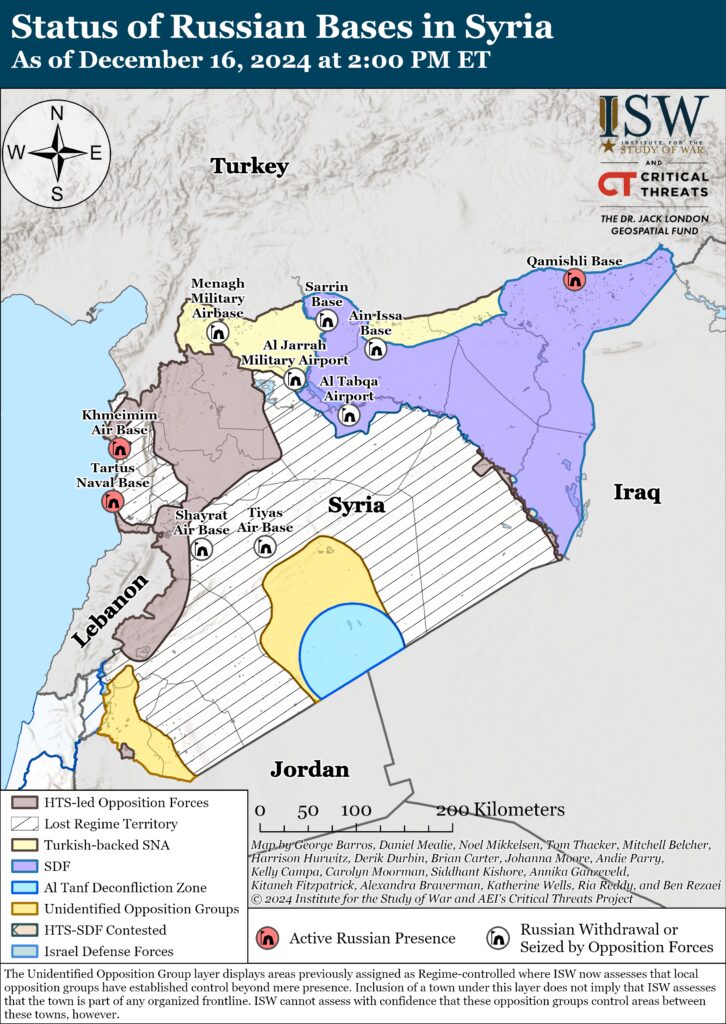
Key Takeaways:
- HTS and the Syrian Security Sector: The HTS-controlled interim government is continuing to reconcile with former members of the Syrian Arab Army (SAA).
- Syrian Transition: HTS has not suggested it will implement key elements of UNSCR 2254 and is attempting to change the resolution’s guidance to account for Syria’s “new reality.” HTS leader Ahmad Shara (Jolani) noted on December 16 that Syria is not ready for elections, and the interim government has so far failed to outline any process for generating a constitution. HTS-selected officials within the transitional government would presumably be relied upon to establish a method to write a constitution, including the selection of various powerbrokers across the country and in different minority groups to attend negotiations.
- Northern Syria: A four-day ceasefire between the Syrian National Army (SNA) and Syrian Democratic Forces (SDF) in the Manbij area expired without an extension on December 16. The Turkish-backed SNA is reportedly seizing private and government property in Manbij. Local media reported that at least some of these seizures target Kurds, “under the pretext of [the Kurds] belonging to the SDF.
- Syrian Democratic Forces: Arab elements continue to defect from the Syrian Democratic Forces. The head of internal security for the al Busayrah and Dhiban region in SDF-controlled Deir ez Zor Province announced he and “hundreds” of his fighters would join the HTS-led Military Operations Department.
- Israel in Syria: The Israel Defense Forces (IDF) continued to operate in southern Syrian towns near the Jordanian border on December 16.
- Israel’s October 25 Strike on Iran: Israel’s large-scale aerial attack on Iranian missile production sites on October 25 significantly damaged Iran’s missile production capability, including its ability to export Iranian-made missiles to partners like Russia and the Houthis.
- ISIS: US Central Command (CENTCOM) is continuing to conduct airstrikes in previously regime-held areas to disrupt ISIS operations.
- Iranian Information Space: Some Iranian media outlets appear to be engaged in an information campaign to stoke sectarian tensions and promote a hardline approach toward the new HTS-led interim government.
- Russia-HTS Negotiations: Russia continues to negotiate with the interim Syrian government to maintain its military presence at the Hmeimim Air Base and Port of Tartus in Syria, but Chechen Republic Head Ramzan Kadyrov’s recent appeals to Hayat Tahrir al Sham (HTS) suggest that talks may have hit a snag.
- Russia in Syria: Russia continues to withdraw elements of its force grouping in Syria to the western coast amid limited reports that Moscow plans to fully withdraw within one month. UK-based, Qatari-owned news outlet Al Araby al Jadeed reported on December 16 that sources “close to the [HTS-led] military operations department” in Syria stated that Russia will withdraw all its military forces from Syria within one month.
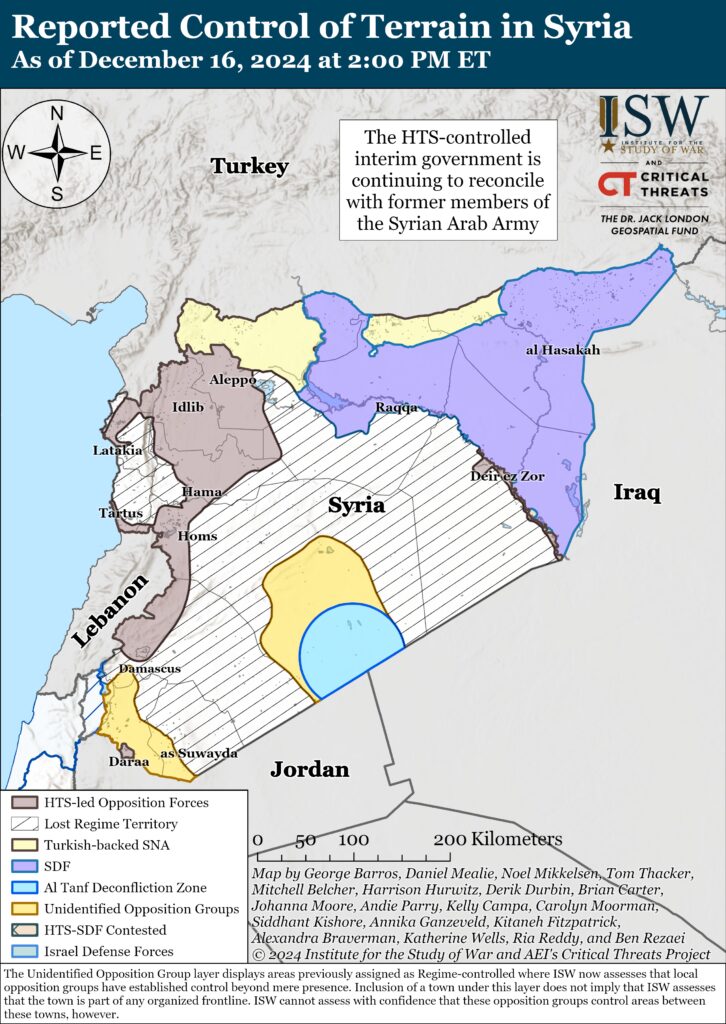
Gaza Strip:
Axis of Resistance objectives:
Erode the will of the Israeli political establishment and public to sustain clearing operations in the Gaza Strip
Reestablish Hamas as the governing authority in the Gaza StripThe IDF continued clearing operations in the northern Gaza Strip on December 16. A Palestinian journalist reported that the IDF conducted a controlled demolition of infrastructure in the Jabalia refugee camp.[78] The Palestinian Islamic Jihad (PIJ) fired a tandem-charge anti-tank rocket targeting an Israeli tank in Jabalia refugee camp.[79]
The IDF conducted an airstrike targeting Hamas fighters operating from a UN-run school complex in Khan Younis, southern Gaza Strip, on December 16.[80] The IDF said that Hamas used the school complex to plan attacks targeting Israeli forces. Palestinian health officials claimed that the airstrike killed at least 20 Gazans.[81]
The al Aqsa Martyrs’ Brigades mortared Israeli forces in eastern Rafah City on December 16.[82]
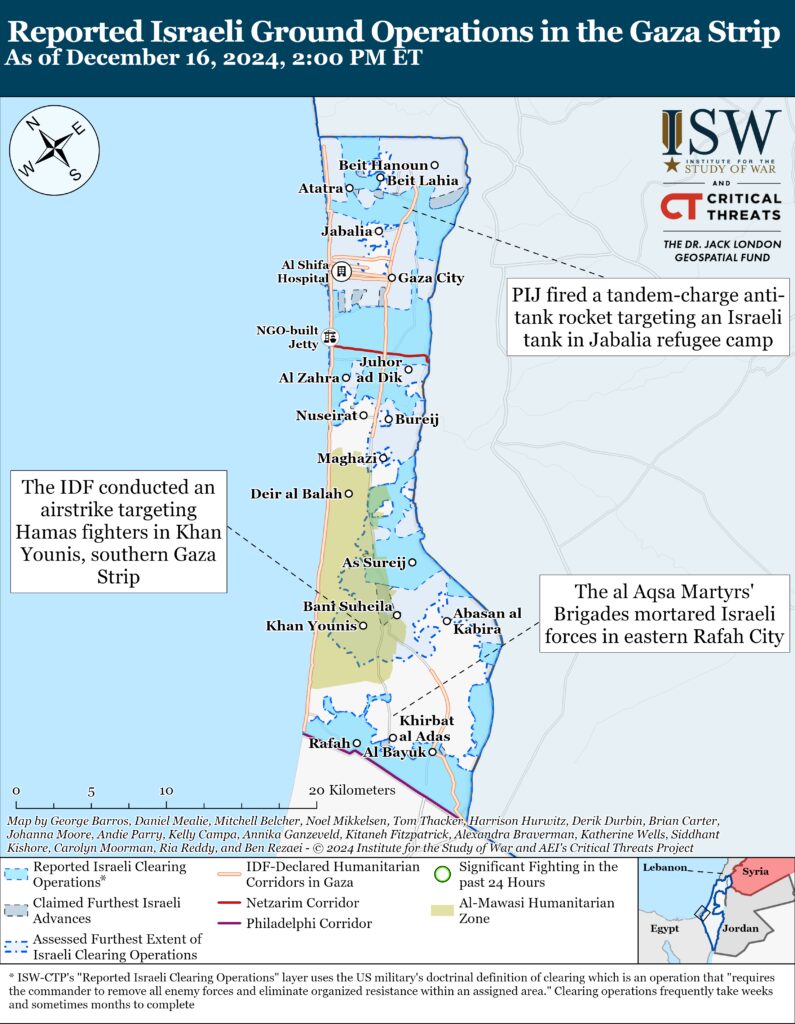
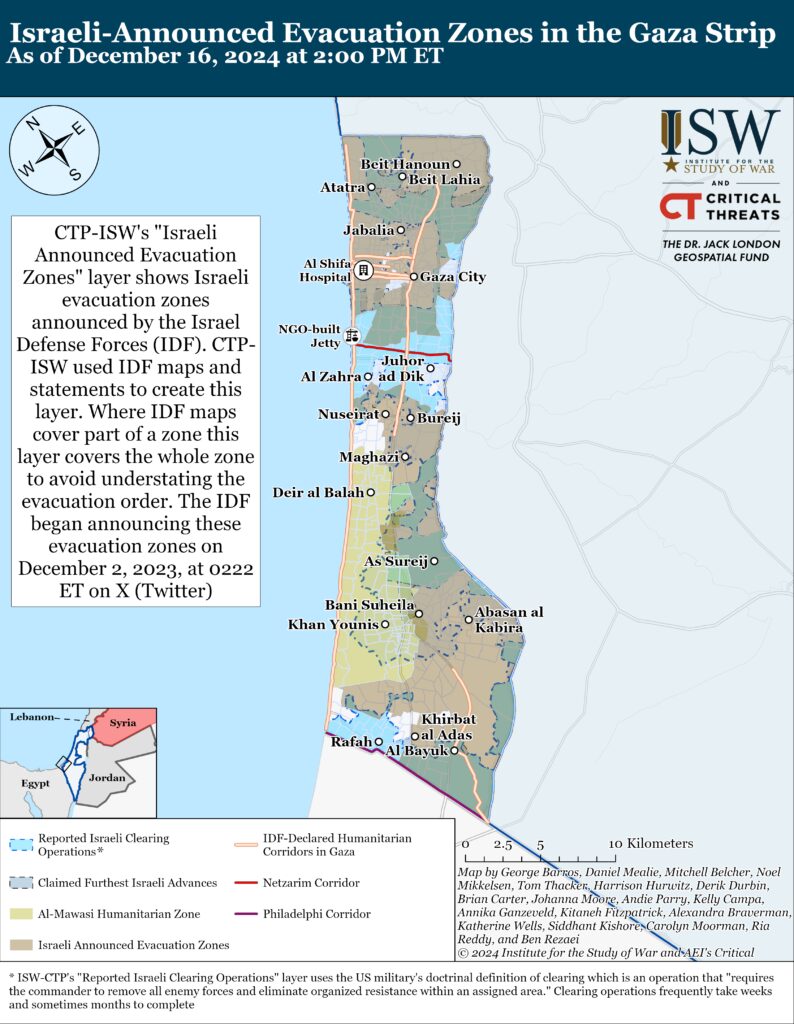
West Bank
Axis of Resistance objectives:
Establish the West Bank as a viable front against IsraelPalestinian Authority (PA) security forces continued operations in the Jenin refugee camp, West Bank, on December 15 and 16.[83] PA security forces have ”taken control” of approximately 50 percent of the Jenin refugee camp, including headquarters and buildings belonging to Palestinian militias, according to an Israeli Army Radio correspondent.[84] PA security forces injured seven unspecified Palestinian militia fighters during this time. PA security forces also destroyed 12 improvised explosive devices (IED) and a car bomb while operating in Jenin refugee camp. These activities are part of a PA-led counterterrorism operation designed to dismantle Palestinian militia infrastructure in the northern West Bank and restore at least a modicum of PA control there.[85]
Northern Israel and Lebanon
Lebanese Hezbollah objectives:
End Israeli operations in the Gaza Strip
Survive the October 7 War as a capable political and military organization with control over LebanonThe IDF 91st Division continued operations in southern Lebanon on December 16. The IDF 769th Territorial Brigade located multiple weapons depots that contained a mobile rocket launcher used to target northern Israeli communities and dozens of mortar shells, anti-tank guided missiles, rockets, and improvised explosive devices (IED).[86]
Lebanese towns immediately north of the Israel-Lebanon border in southeastern Lebanon remain clear of Hezbollah fighters, according to Israeli journalists. The IDF allowed Israeli journalists to visit several southeastern border Lebanese towns on December 15 and 16 during a press tour.[87] The journalists’ presence in these villages in southeastern Lebanon suggests that these villages remain free of Hezbollah fighters. An Israeli Army Radio correspondent noted a lack of Hezbollah fighter presence in Kfar Kila and compared the “dimension” of destruction in the village to that of the Gaza Strip.[88] The correspondent also said that a lack of infrastructure would prevent the “immediate” return of Lebanese civilians to Odassieh, south of Kfar Kila.[89] The correspondent noted that Israeli armor had “complete freedom of action” in Mays al Jabal.[90]
The Israeli Army Radio correspondent added that the IDF is beginning to deploy to areas of northern Khiam in line with the IDF’s enforcement of the ceasefire.[91] The Lebanese Armed Forces (LAF) and United Nations Interim Force in Lebanon (UNIFIL) backfilled the IDF 7th Armored Brigade in Khiam after the brigade withdrew on December 11.[92] The IDF has continued to warn Lebanese civilians from returning to southern Lebanon.[93]
Lebanese media reported that Israeli forces conducted controlled detonations of unidentified buildings in Markaba, southeastern Lebanon on December 16.[94]
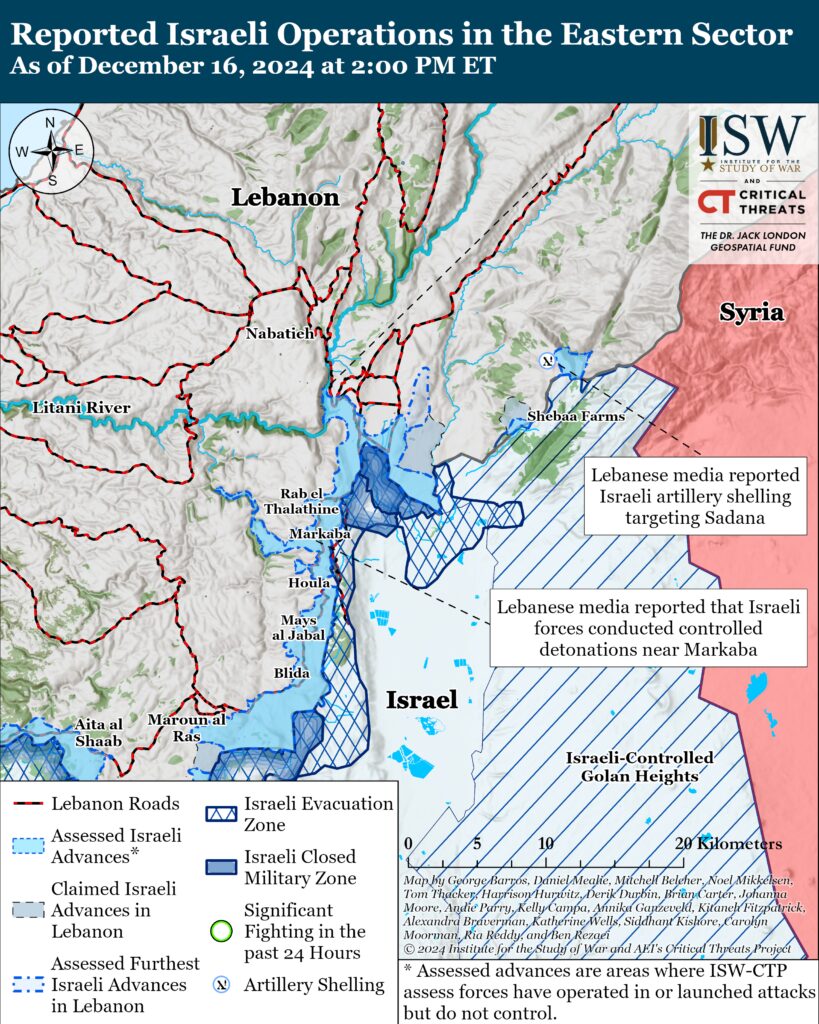
Lebanese media reported IDF activity in Naqoura, southwestern Lebanon, on December 16.[95] Israeli forces reportedly conducted controlled detonations of buildings and fired small arms in the area.[96] Hezbollah media claimed that Israeli armor entered neighborhoods in Naqoura.[97] Lebanese media last reported that Israeli forces conducted controlled detonations of residential buildings in Naqoura on December 11.[98]
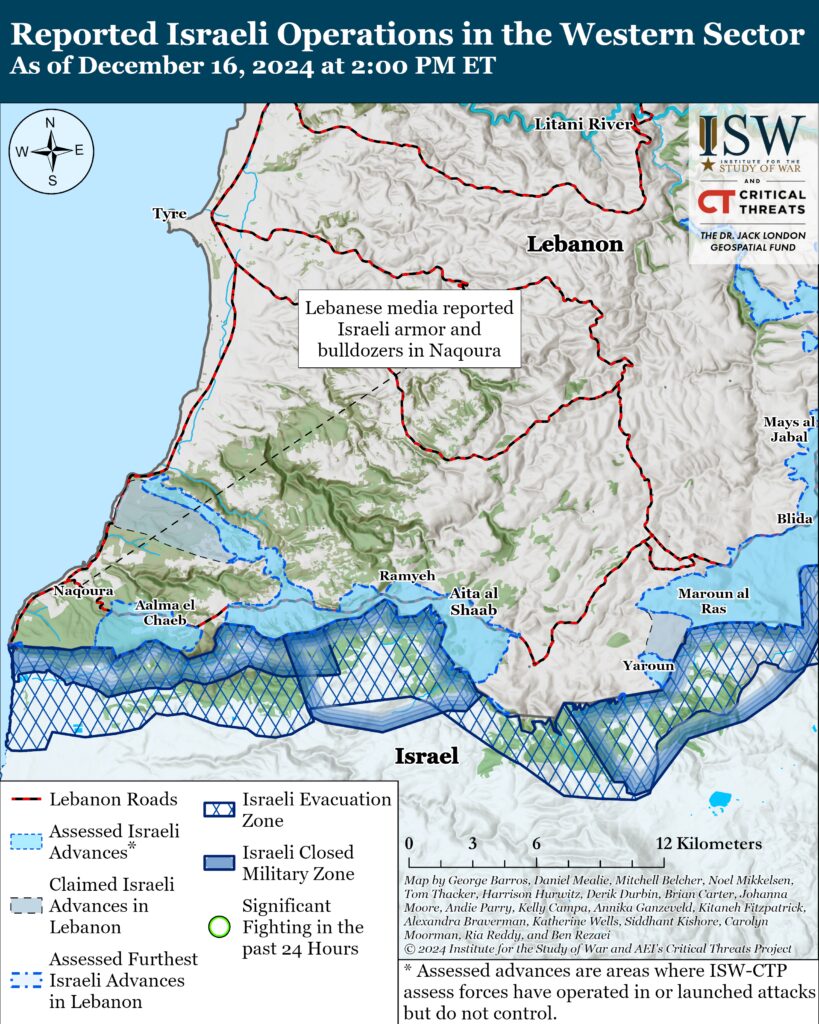
Lebanese media reported that the IDF Air Force conducted two airstrikes near the Sidon area, in southwestern Lebanon, on December 16. Lebanese media reported that the IDF Air Force struck the area between al Bisariya and Tefahta.[99] Lebanese media also stated that the IDF conducted an airstrike near the town of Najjarieh.[100] The Lebanese Ministry of Health claimed that the Israeli airstrike in Najjarieh wounded three individuals.[101] The IDF has not commented on the airstrikes at the time of this writing. The IDF Air Force previously struck the Sidon area on December 13.[102]
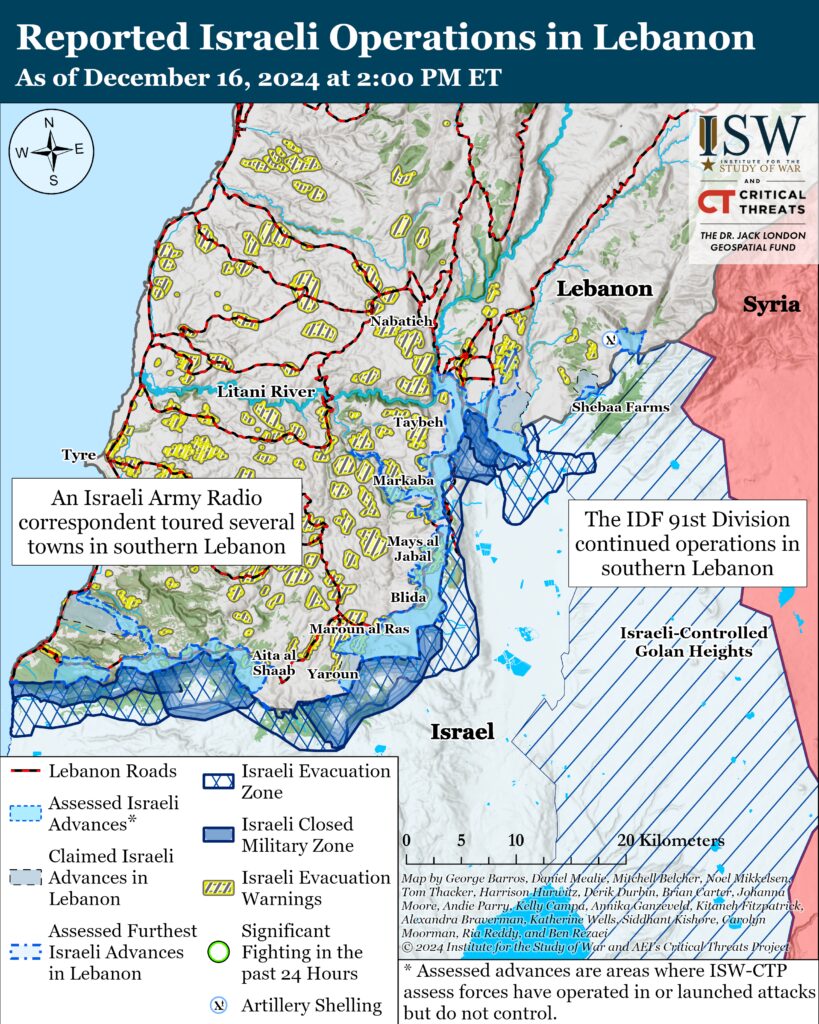
Iran and the Axis of Resistance
US Secretary of State Antony Blinken asked Iraqi Prime Minister Mohammad Shia al Sudani to prevent Iranian weapons shipments to Syria via Iraq during an unannounced visit to Baghdad on December 13, according to an unspecified US official speaking to Bloomberg.[103] Blinken emphasized that Syria “remains in a fragile state” and that Iranian weapons shipments to Syria could “further destabilize the country,” according to the US official.[104] CTP-ISW previously assessed that Iran may try to support militias in Syria to combat opposition forces and US-Israeli “interference” while undermining any new government in Syria.[105] Iraqi media separately reported on December 14 that Blinken called on the Iraqi federal government to prevent Iranian-backed Iraqi militias from conducting “operations” in Syria.[106] Iranian-backed Iraqi militias had long operated in Syria prior to the fall of the Assad regime. It is unclear whether the Iraqi federal government is willing and capable of preventing Iranian arms shipments and Iranian-backed Iraqi militia activity in Syria.
Bloomberg reported on December 15 that US sanctions on oil tankers have disrupted Iranian crude exports to China.[107] Bloomberg stated that there were unspecified disruptions to October shipments of Iranian oil to China and that Iran did not deliver some of its oil exports in November, according to energy market intelligence firm Vortexa Ltd. Chinese buyers require cargo to be delivered on non-sanctioned vessels. Some independent Chinese refiners, which were recently granted additional import quotas, will likely face challenges because of these disruptions.
The value of the Iranian rial hit a new all-time low on December 16.[108] One US dollar equates to 760,000 rials in Tehran. The Iranian rial has experienced a significant decline from 584,000 rials, with market analysts suggesting potential Central Bank interventions through hard currency reserve injections. The ongoing economic challenges, which have been exacerbated by international sanctions related to Iran’s nuclear program and persistent issues like currency devaluation and inflation, continue to pose substantial risks to the country’s economic stability. This will likely worsen if the incoming Trump administration pursues maximalist policies and harsh sanctions on Iran.
Houthi military spokesperson Brigadier General Yahya Sarea claimed on December 16 that the Houthis fired a Palestine 2 “hypersonic” ballistic missile targeting an Israeli military site in the Tel Aviv-Jaffa area, Israel.[109] The IDF intercepted a missile launched from Yemen on December 16 before they both entered Israeli territory.[110] The IDF separately intercepted a drone over the Red Sea that the Houthis launched from Yemen.
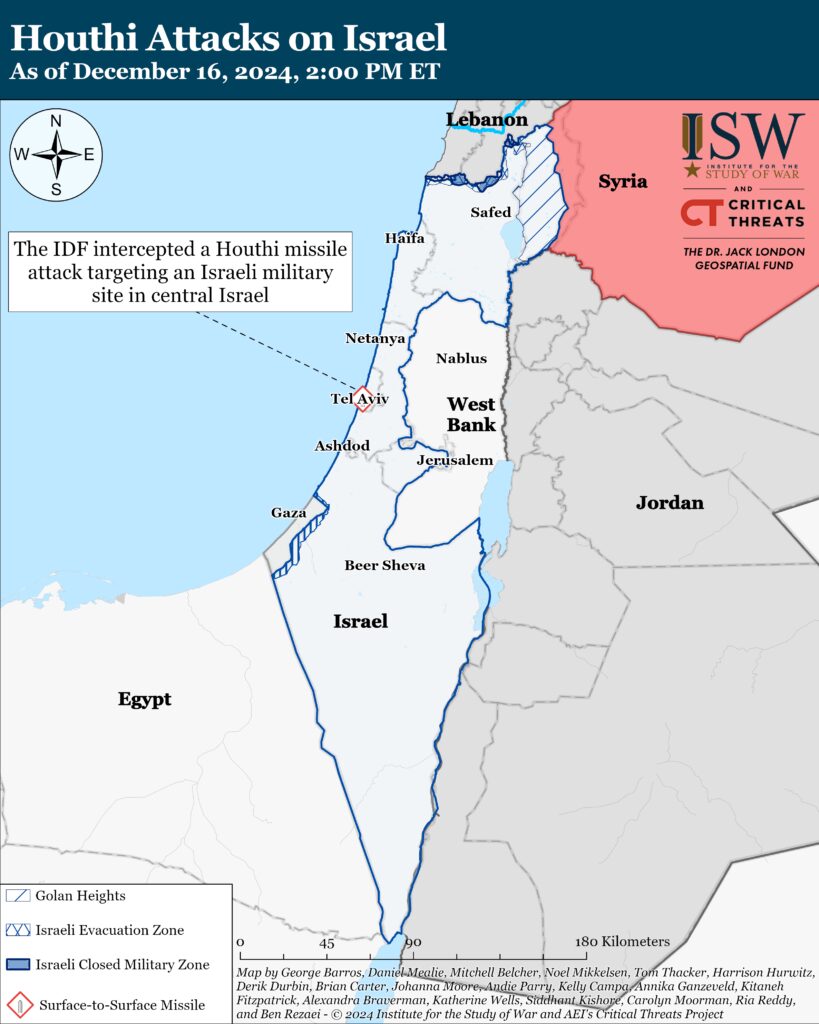
The Iran Update provides insights into Iranian and Iranian-sponsored activities abroad that undermine regional stability and threaten US forces and interests. It also covers events and trends that affect the stability and decision-making of the Iranian regime. The Critical Threats Project (CTP) at the American Enterprise Institute and the Institute for the Study of War (ISW) provides these updates regularly based on regional events.
CTP-ISW defines the “Axis of Resistance” as the unconventional alliance that Iran has cultivated in the Middle East since the Islamic Republic came to power in 1979. This transnational coalition is comprised of state, semi-state, and non-state actors that cooperate to secure their collective interests. Tehran considers itself to be both part of the alliance and its leader. Iran furnishes these groups with varying levels of financial, military, and political support in exchange for some degree of influence or control over their actions. Some are traditional proxies that are highly responsive to Iranian direction, while others are partners over which Iran exerts more limited influence. Members of the Axis of Resistance are united by their grand strategic objectives, which include eroding and eventually expelling American influence from the Middle East, destroying the Israeli state, or both. Pursuing these objectives and supporting the Axis of Resistance to those ends have become cornerstones of Iranian regional strategy.
 Eurasia Press & News
Eurasia Press & News
